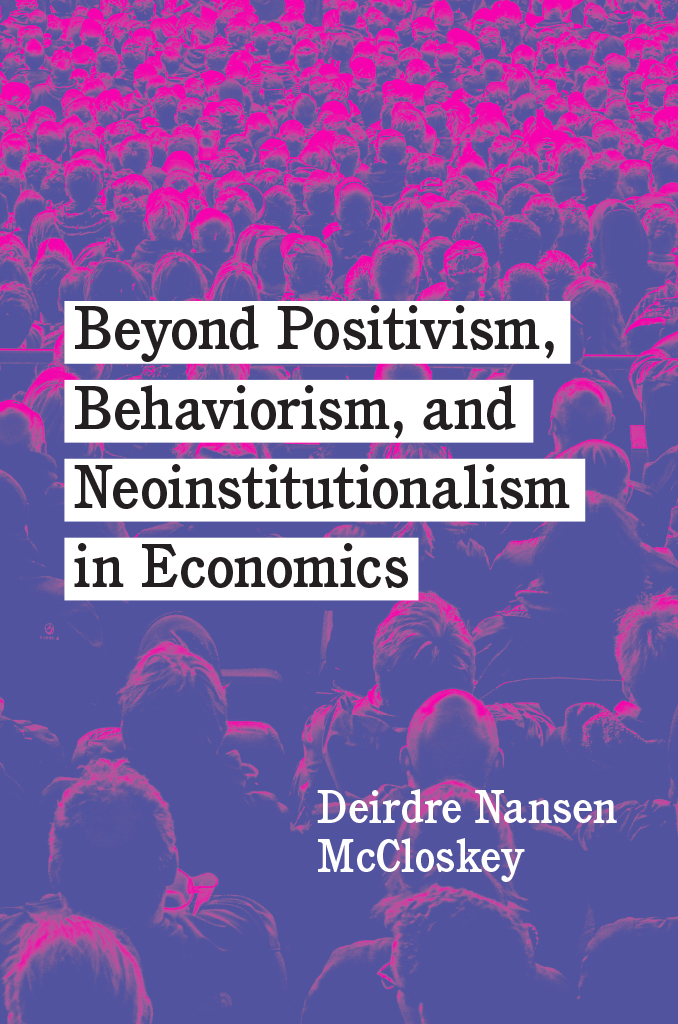
Beyond Positivism, Behaviorism, and Neoinstitutionalism in Economics
Beyond Positivism, Behaviorism, and Neoinstitutionalism in Economics
DEIRDRE NANSEN MCCLOSKEY
THE UNIVERSITY OF CHICAGO PRESS
CHICAGO AND LONDON
The University of Chicago Press, Chicago 60637
The University of Chicago Press, Ltd., London
2022 by The University of Chicago
All rights reserved. No part of this book may be used or reproduced in any manner whatsoever without written permission, except in the case of brief quotations in critical articles and reviews. For more information, contact the University of Chicago Press, 1427 E. 60th St., Chicago, IL 60637.
Published 2022
Printed in the United States of America
31 30 29 28 27 26 25 24 23 22 1 2 3 4 5
ISBN -13: 978-0-226-81830-6 (cloth)
ISBN -13: 978-0-226-81944-0 (paper)
ISBN -13: 978-0-226-81831-3 (e-book)
DOI : https://doi.org/10.7208/chicago/9780226818313.001.0001
Library of Congress Cataloging-in-Publication Data
Names: McCloskey, Deirdre N., author.
Title: Beyond positivism, behaviorism, and neoinstitutionalism in economics / Deirdre Nansen McCloskey.
Description: Chicago : University of Chicago Press, 2022. | Includes bibliographical references and index.
Identifiers: LCCN 2021056675 | ISBN 9780226818306 (cloth) | ISBN 9780226819440 (paperback) | ISBN 9780226818313 (e-book)
Subjects: LCSH : EconomicsPhilosophy. | Positivism. | Philosophical behaviorism. | New institutionalism (Social sciences)
Classification: LCC HB 72. M 3295 2022 | DDC 330.01dc23/eng/20220103
LC record available at https://lccn.loc.gov/2021056675
 This paper meets the requirements of ANSI/NISO Z 39.48-1992 (Permanence of Paper).
This paper meets the requirements of ANSI/NISO Z 39.48-1992 (Permanence of Paper).
Contents
The Argument in Brief
I offer here a criticism and then a reshaping of my beloved economic science. The criticism is sometimes harsh, exhibiting indignation against those I conceive to have misshapen it. Adam Smith ([1759] 1790) warned early in The Theory of Moral Sentiments (1.1.1.6) that indignation can arouse a paradoxical sympathy for its target. As we are unacquainted with... [the] provocation... we cannot... conceive anything like the passions which it excites. I worry that my passions, and even my attempts at wit (to which I am addicted), will dispose you to take the part against what aroused my indignation. Lets see, and at the least I acquaint you with the provocation.
The detailed criticism arrives at a recommendation for humanomics, sketched in of this book and explained more fully in another book, Bettering Humanomics: A New, and Old, Approach to Economic Science. The two books are a pair. The elevator pitch is that to get an adequate economic science we need one that uses broader but nonetheless more rigorous theorizing and broader but nonetheless more serious empiricism than at present.
And we need, as ethical social scientists, to be rigorously modest. Good science, surely, and most obviously good social science, should be made by good, open, honest, voluntaristic, liberal people, or else it is liable to break bad. (I will use the word liberal throughout, you can see, not in is strange American sense since the 1920s but in its original and international meaning, that is, a society composed on nonslavesliberated adults, liberi, not slaves to husbands or masters, to kings or bureaucrats.)
Such a conclusion about economic science was hinted at back in 1994, in Knowledge and Persuasion in Economics (McCloskey 1994). Fully twenty-five years later, Why Liberalism Works: How True Liberal Vales Produce a Freer, More Equal, Prosperous World for All finally got the politics of it more or less straight. (I am not the swiftest of thinkers.) In particular in the present book I argue that neoinstitutionalism, and other positivist, antiethical, neobehaviorist, manipulative, and illiberal movements over the past few decades in economics dont fit the bill for an ethical and scientific economics suited to liberated adults.
I respond here to various counterclaims implicit in the present-day method and substance of economics. Responding, understand, is not merely irritated disputation or somehow impolite. Its the only alternative to an authoritarian hierarchy in science of the sort that prevented American geologists from accepting plate tectonics for fifty years and prevented Mayanists from decoding glyphs for thirty years and prevented economists from challenging Keynesianism for twenty years. Responding is what scientistsor citizens or lawyers or marriage partnersshould do, every time, as amiably as they can manage. Whats your position? Oh, I see. Hmm. Well, dear, consider my amiable response to your logic and evidence. Maybe we can reach agreement. Lets discuss it. You come too. Its the human conversation of a good science, in the laboratory or the seminar room. So I went to it with a will. (Youre welcome.)
We should all try to follow the motto of the philosopher Amlie Oksenberg Rorty, who wrote in 1983 that what is crucial is our ability to engage in continuous conversation, testing one another, discovering our hidden pre-suppositions, changing our minds because we have listened to the voices of our fellows. Lunatics also change their minds, but their minds change with the tides of the moon and not because they have listened, really listened, to their friends questions and objections. Its how science advances, really advances, whether on little matters such as an econometric coefficient or on world-shaping claims such as put forward by Newton or Darwin or Marx or Keynes. The procedure is this: By careful listening to the rhetoric, find out whats really being said and how it is argued, and therefore what might be mistaken in an earlier piece of science. If its mistaken, fix it. The method in a word is critique. In 1867 the subtitle of Marxs Kapital was Kritik der politischen konomie. Thats the scientific spirit.
The discoveries I have made through critique about my beloved economics and economic history are two:
- 1. In the other book, and by implication here, too, I claim that there is emerging a new and more serious and sensible way of doing economic sciencequantitatively serious, philosophically serious, historically serious, and ethically serious too. The economist Bart Wilson and a few others nowadays call it humanomics.
- 2. In this book I give an example in detail of what appears to be wrong with nonhumanomical economics. The example is neoinstitutionalism, put forward over the past few decades by Douglass North and Daron Acemoglu among many other superb economists and political scientists. I claim that neoinstitutionalism is not the way forward in the science or in its policy recommendations. If people as smart as North and Acemoglu and the rest can get our science so wrong, we need to stop to think.
Scientifically speaking, the factual claims of neoinstitutionalism, like those of the other recent fashionssuch as neuroeconomics and behavioral finance and happiness studiesare dubious. Like the others, the neoinstitutionalists do not listen, really listen, to the evidence of humans or to their friends scientific questions and objections. Substantively and rhetorically, they treat creative adults like a flock of little children, three-year-olds to whom we scientists need not listen. We need merely, they say, to observe their behavior (omitting for some reason linguistic behavior) and then record the behavior in questionable metrics. Then the children-citizens are to be pushed around with incentives, the beloved of Samuelsonian economists and econowannabes. From a great height of fatherly expertise in the designing of Max U institutions, the behaviorist looks down with sneering contempt on the merely human actions of liberated adults. It gives me the creeps. It should give you the creeps, too.
Next page
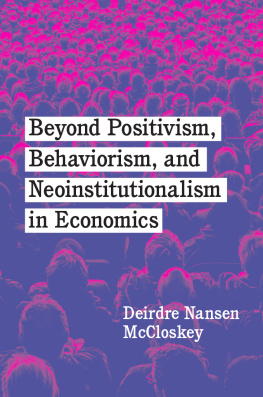

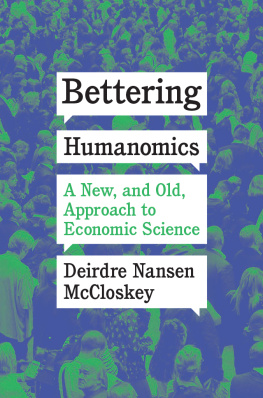



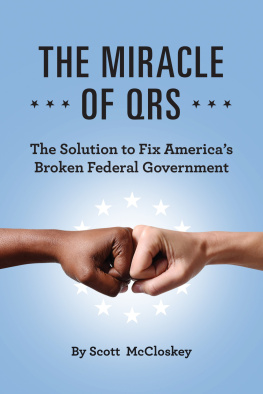
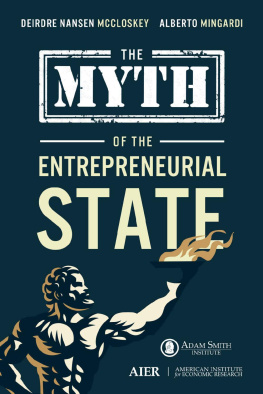
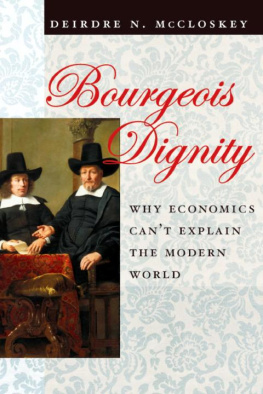


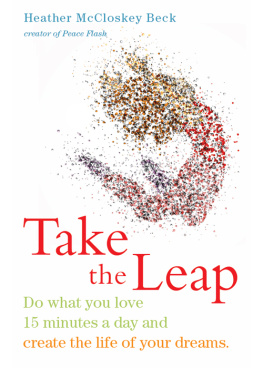

 This paper meets the requirements of ANSI/NISO Z 39.48-1992 (Permanence of Paper).
This paper meets the requirements of ANSI/NISO Z 39.48-1992 (Permanence of Paper).